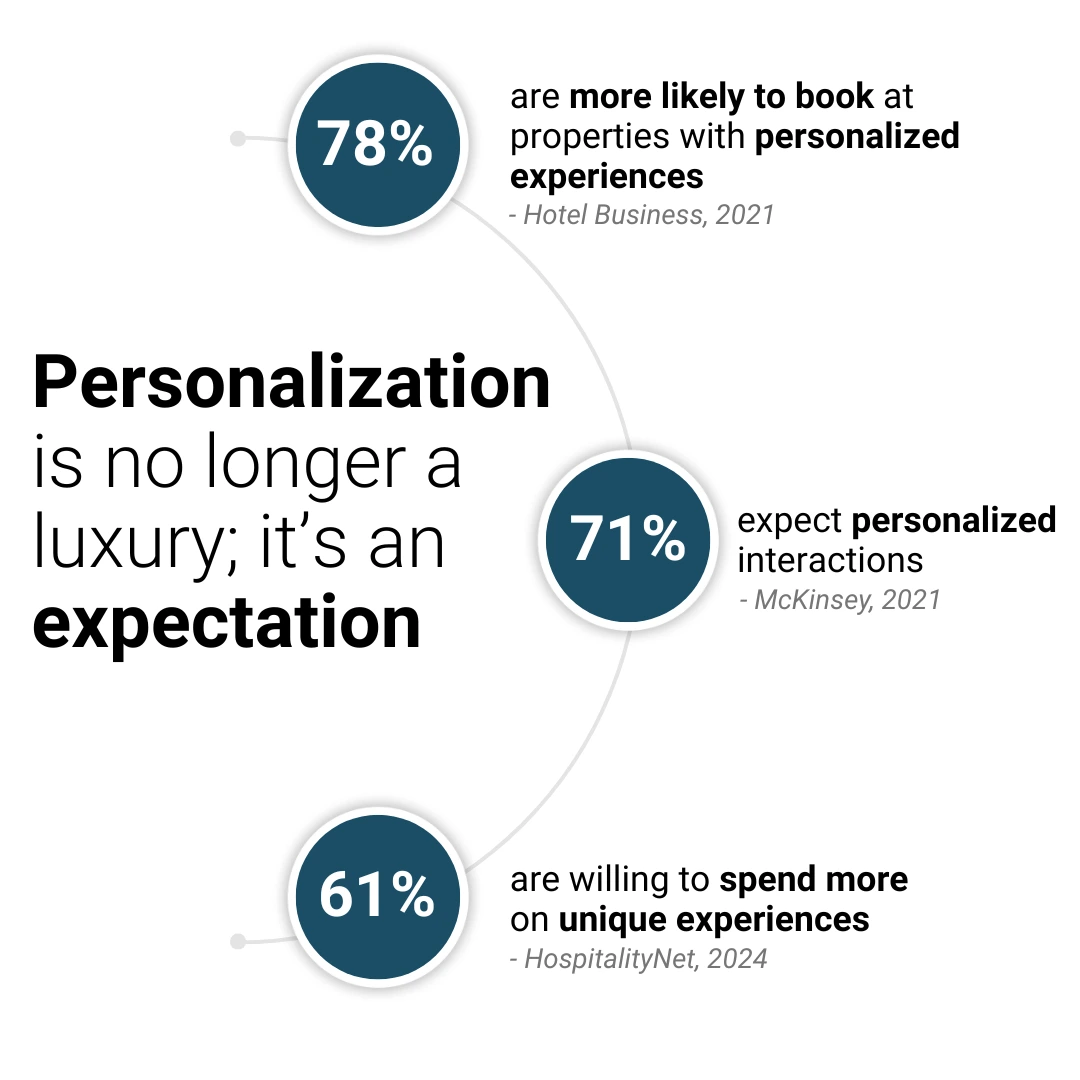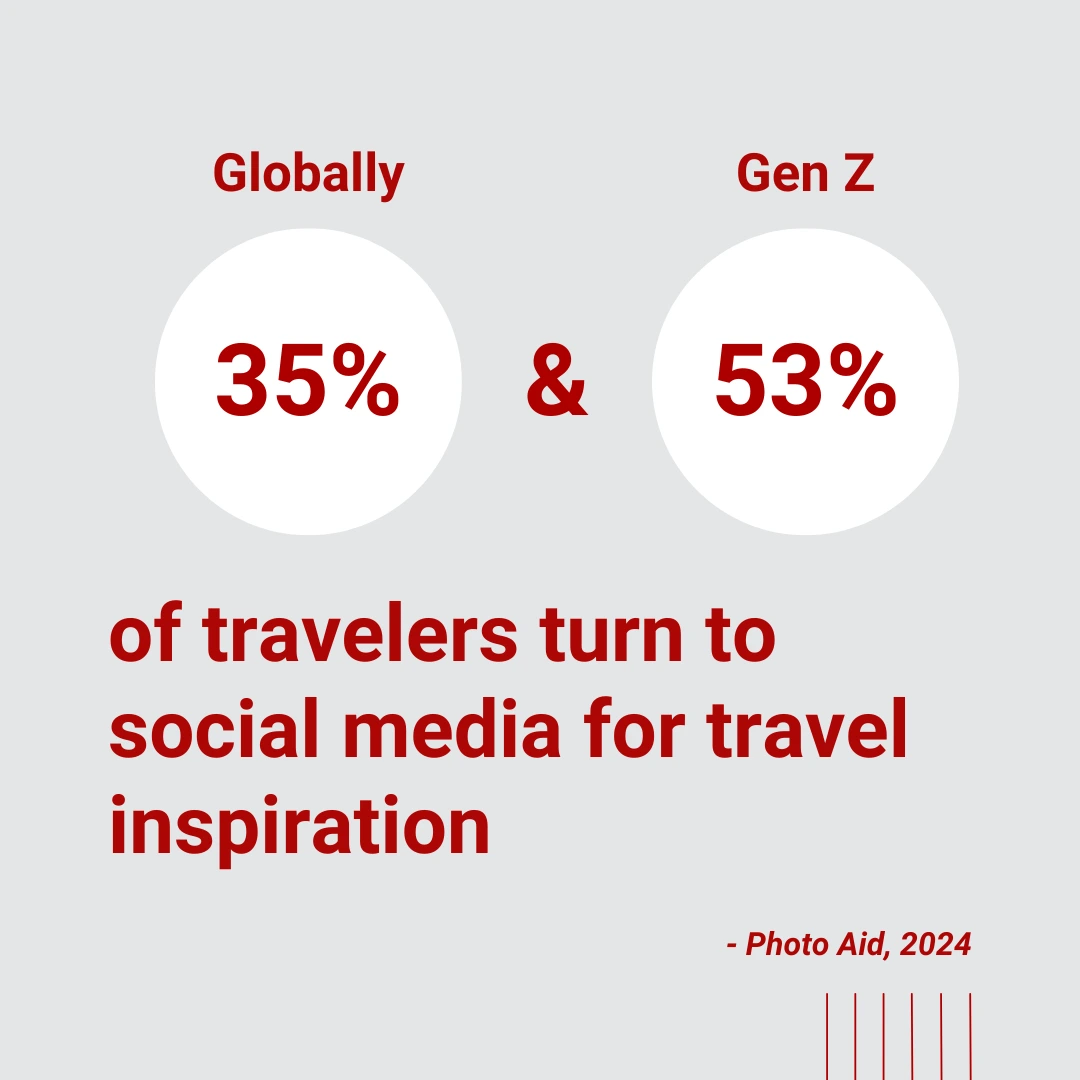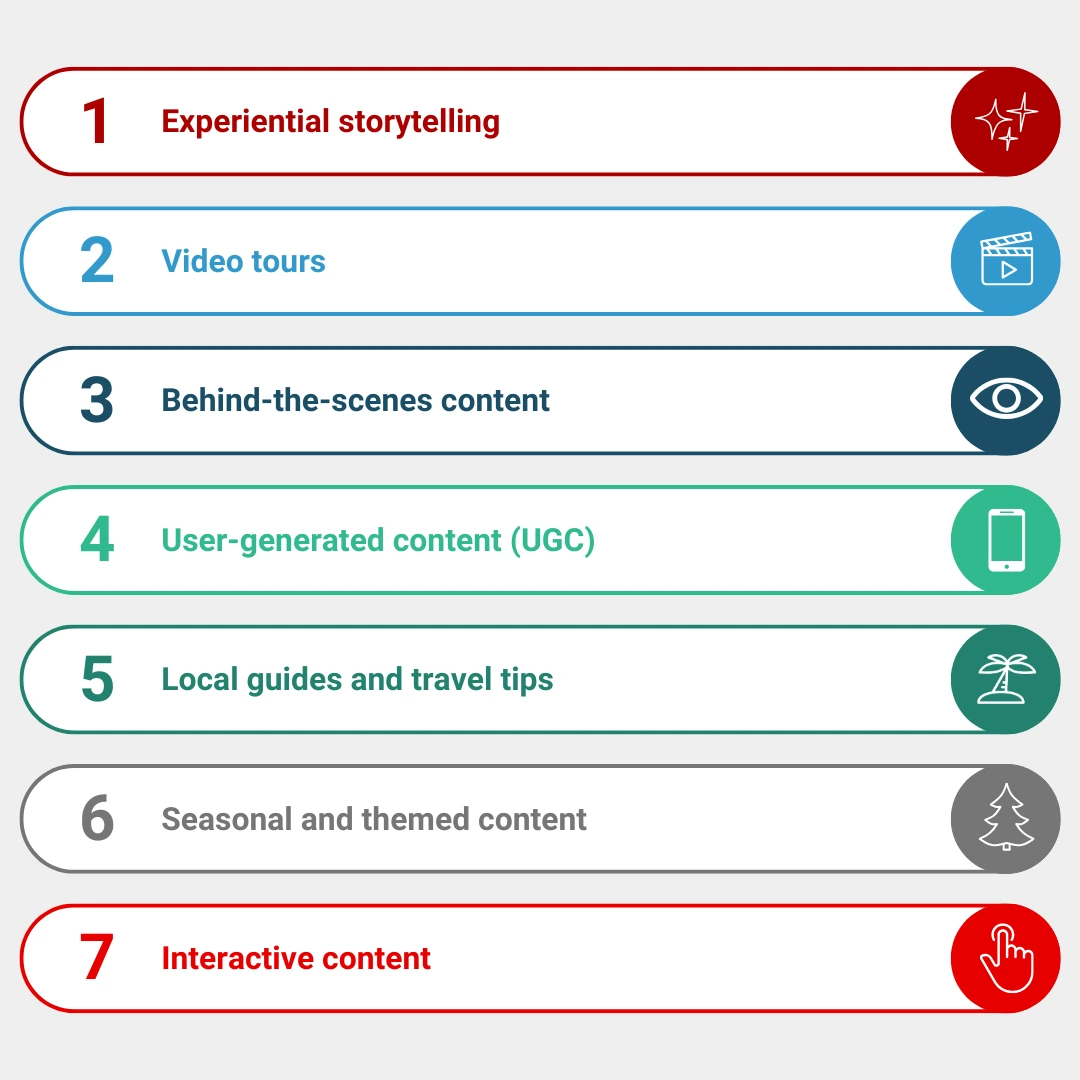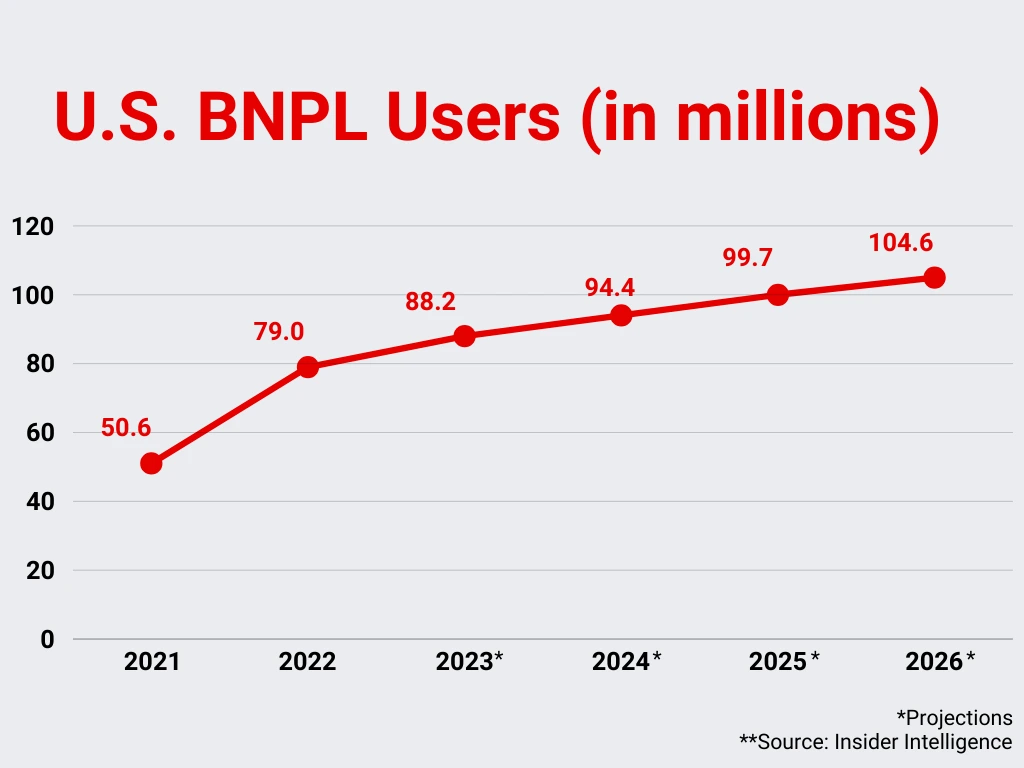Key takeaways:
- Optimize for mobile: Ensure a seamless booking experience on mobile devices
- Enhance SEO efforts: Use localized keywords and voice optimization to improve visibility
- Take social media to the next level with short-form videos and engaging content
- Re-engage potential guests with targeted email campaigns
- Collaborate with influencers for authentic storytelling to reach niche audiences
1: Optimize your hotel website for mobile
In 2025, offering a seamless mobile booking experience isn’t just a bonus—it’s a necessity. As mobile traffic continues to dominate online behavior, with around two-thirds of global travel and hospitality website traffic coming from mobile devices in 2023, your hotel’s website must be fully optimized for mobile users to compete.
A key part of this optimization is having a robust, mobile-responsive booking engine that meets modern traveler expectations. The booking experience on mobile should be fast, intuitive, and hassle-free. This means selecting a booking engine that offers:
- Speed: Fast load times to prevent drop-offs, ensuring potential guests don’t abandon the process due to lag or delays.
- Simplicity: A streamlined booking process with fewer steps and clear progress indicators to keep users engaged.
- Mobile-Friendly Payment Options: Support for digital wallets and flexible payment methods like Buy Now, Pay Later (BNPL), allowing guests to choose what’s convenient for them.
- Easy Navigation: Smooth navigation with touch-friendly buttons, simplified menus, and intuitive controls tailored for mobile users.
- Effective Calls-to-Action (CTAs): Clear and prominent CTAs that prompt users to book without frustration, enhancing conversion rates.
By integrating a well-optimized mobile booking engine that offers these essential features, you’ll not only increase direct bookings but also improve guest satisfaction and ultimately boost your bottom line.
2: Take SEO to the next level
While SEO has long been a standard strategy for digital marketing, 2025 brings a shift in how SEO must be approached, especially for larger hotel chains that may not own their primary domain but instead operate under subdomains. Even within these constraints, optimizing for search engines is crucial to driving organic traffic and bookings. However, SEO is increasingly complex and requires ongoing effort, including technical expertise and strategic content development.
What’s new for 2025? The evolution of search algorithms emphasizes user experience and content relevance even more, making it critical to focus on:
75% of internet users don’t scroll past the first page of search results
Source: Hubspot, 2024
- Localized SEO: Target hyper-local keywords (e.g., “best beachfront hotels near Miami”) that align with specific traveler searches. This is especially effective for chains managing multiple properties in different regions.
- AI-powered content creation and optimization: Use AI tools to help with real-time content optimization, ensuring your website stays relevant and competitive in search rankings.
- Voice search optimization: With the rise of voice assistants like Alexa and Google Home, make sure your site is optimized for voice queries, often phrased as questions (e.g., “What are the best hotels in Lubbock?”).
- SEO for mobile: As mobile-first indexing continues, ensuring your mobile site ranks well on search engines is vital for both individual hotels and chains.
Remember, SEO is not a set-and-forget strategy—it requires constant updates and expertise to stay ahead in a crowded digital landscape. By keeping up with new developments in search algorithms and technology, your hotel chain can maintain visibility and capture direct bookings in an increasingly competitive market.
3. Personalization becomes mandatory
In 2025, personalization is no longer a luxury; it’s an expectation. Today’s travelers don’t just want to book a room—they want to curate a personalized experience that matches their preferences. Offering more than just a standard booking, hotels must go beyond the basics by personalizing every step of the guest journey.

Leverage tools like SynXis Retailing or similar solutions to enable guests to book tailored experiences, such as:
- Room upgrades, spa treatments, and local experiences based on previous preferences or loyalty history
- Custom packages that reflect special interests, like adventure activities, wellness retreats, or culinary experiences
- Automated upsells and add-ons during the booking process, like exclusive dining reservations or transportation services
Personalization boosts both guest satisfaction and revenue, allowing hotels to offer unique, curated stays that resonate with individual travelers. Whether they’re booking a weekend getaway or a longer stay, guests will appreciate the personalized touch, making it easier to build loyalty and stand out in a competitive market.

4. Leverage short-form videos and stories
In 2025, social media is no longer just a place for brand awareness—it’s a powerful search engine and booking tool. Travelers are using platforms like TikTok, Instagram, and YouTube as primary sources for discovering their next destination. Globally, 35% of consumers turn to social media for travel inspiration. For Gen Zers, this number jumps to 53%.
To stay ahead, hotels must prioritize short-form video content and capitalize on the growing demand for exclusive, limited-time offers.

What’s trending?
- Short-form videos: With attention spans shrinking, platforms like TikTok and Instagram Reels are dominating. Hotels should use quick, visually compelling videos to highlight unique property features, guest testimonials, and local experiences. These videos are highly shareable, with video content generating 1200% more shares than text and images combined.
- Social media as a search engine: More travelers, especially Gen Z, are turning to social media to find travel recommendations and make decisions. Create content that is not only engaging but also easily searchable using relevant hashtags, geotags, and keywords tailored to your property’s location and offerings.
- Limited edition offers: Tap into the fear of missing out (FOMO) by creating exclusive, time-sensitive offers promoted on social media. These offers could include limited-time discounts, room upgrades, or access to unique experiences like private tours or dining packages. The sense of urgency can drive immediate bookings and boost your social media engagement.
- Content is king: Authentic, user-generated content and influencer partnerships continue to reign. Encourage influencers to create stories or short-form videos featuring your property, focusing on unique aspects or behind-the-scenes experiences. Run social media contests where past guests share their favorite moments from their stay to further amplify your reach.
By combining the power of video, the role of social media as a discovery tool, and the allure of limited edition offers, your hotel can stay at the forefront of digital marketing and drive bookings in 2025.
5: Focus on content marketing that drives engagement
In 2025, content marketing will continue to be critical for hotels looking to establish authority, attract guests, and enhance engagement. As competition intensifies, hoteliers must create relevant, compelling content that resonates with their target audience. Here are the key content trends and ideas for hoteliers to consider:

What content will take control in 2025?
- Experiential storytelling: Share authentic stories that capture the essence of your property and local culture, featuring past guests and unique events
- Video tours and behind-the-scenes content: Produce engaging videos showcasing property features, staff interviews, or guest experiences to build a connection with your audience
- User-generated content (UGC): Encourage guests to share their experiences with a specific hashtag and curate this content on your platforms to enhance authenticity
- Local guides and travel tips: Create detailed guides highlighting attractions, dining options, and activities in the area, positioning your hotel as a local expert
- Seasonal and themed content: Align your marketing with seasonal events and local festivals, creating related packages and promotions to attract guests
- Interactive content: Use quizzes, polls, and contests to engage users and gather insights about their preferences, enhancing their connection to your hotel
By focusing on these content trends—experiential storytelling, video engagement, user-generated content, local insights, seasonal themes, and interactivity—hoteliers can create compelling marketing strategies that resonate with potential guests and drive bookings in 2025.
6: Utilize email marketing for retargeting
Email marketing, when integrated with a robust booking engine, can be a powerful tool for retargeting potential guests. By using the booking engine’s data and retailing capabilities, you can segment and target guests who have visited your site, interacted with your content, or signed up for your newsletter but haven’t completed a booking yet.
Key types of email marketing campaigns include:
- Abandoned cart emails: Remind guests who began booking but didn’t complete the process
- Pre and post-stay emails: Include additional upsell opportunities like room upgrades or add-on services
7: Integrate Buy Now, Pay Later (BNPL) options
The Buy Now, Pay Later (BNPL) trend has exploded in popularity, especially within the travel industry. Integrating BNPL options like Flex Pay into your booking system makes it easier for guests to book larger, more luxurious stays by breaking the cost into smaller, manageable payments.
Not only does this attract budget-conscious travelers, but it can also increase the value of each booking by encouraging guests to add extra amenities or book longer stays.

8: Partner with influencers and travel bloggers
In 2025, influencer marketing is shifting toward a focus on authenticity and niche audiences. To effectively reach potential guests, hotels should collaborate with influencers who create genuine connections and compelling narratives. Here are the latest trends and takeaways for successful influencer partnerships:
69% of consumers trust influencers over information coming directly from a brand
Source: Matter Communications, 2023
Latest trends in influencer marketing:
- Micro and nano-influencers: These influencers often have higher engagement rates and create more relatable content due to their smaller, dedicated followings.
- Experience-driven content: Encourage influencers to share personal stories and immersive experiences related to your hotel rather than just promotional posts. This approach makes their recommendations feel more authentic.
- Short-form video content: Platforms like TikTok and Instagram Reels are increasingly popular for travel content. Leverage these formats to showcase unique aspects of your property through engaging, bite-sized videos.
- Long-term partnerships: Establish ongoing relationships with influencers to build trust with their audiences. Consistent engagement with your brand enhances credibility and loyalty among potential guests.
- Trackable campaigns: Implement unique promo codes or hashtags to measure the effectiveness of influencer collaborations, allowing you to assess ROI and refine future strategies.
By focusing on these trends—micro and nano-influencers, experience-driven content, short-form videos, long-term partnerships, and trackable campaigns—hotels can enhance their influencer marketing strategies in 2025, reaching new audiences and driving bookings effectively.
9: Promote your loyalty program
A strong loyalty program is essential for driving repeat business and increasing lifetime value per guest. Your program should offer tangible benefits such as:
- Free nights or room upgrades
- Exclusive offers
- Early check-in and late check-out
44% of consumers say loyalty programs influence their hotel selection
Source: SevenRooms, 2022
Market your loyalty program through all channels—on your website, social media, and in email campaigns. Make it easy for guests to join and emphasize how the rewards can enhance their experience.
10: Enhance your booking engine
Your booking engine should provide a seamless, user-friendly experience. As direct bookings become increasingly valuable to hotels looking to bypass the fees of third-party booking sites, your booking engine needs to keep pace with new trends and technologies to stay competitive.
Ensure your booking engine offers:
- Real-time availability with transparent pricing: Offering these features ensures that guests can instantly see which rooms are open, appealing to guests looking for a reliable, hassle-free experience.
- Multiple payment options, including BNPL: Flexibility in payment methods will be a critical differentiator for hotels in 2025. More travelers are looking for convenient and flexible ways to finance their trips.
- Upsell and cross-sell opportunities: In 2025, advanced booking engines will be more advanced at offering tailored recommendations based on user behavior, past bookings, or preferences
Looking ahead: Drive more bookings with marketing in 2025
As we approach 2025, adapting to the hospitality landscape is crucial for hotels. By embracing innovative marketing strategies—ranging from mobile optimization to personalized guest experiences and influencer partnerships—hoteliers can capture the attention of travelers and drive bookings.
The focus should be on creating seamless, engaging, and memorable experiences that resonate with potential guests. Start implementing these strategies today to position your hotel for success in the coming year.
Related articles:
Written by Maura Valentine
SynXis Booking Engine
SynXis Booking Engine helps you exceed the capabilities of a standard hotel booking engine, optimizing your direct path and converting customers.




